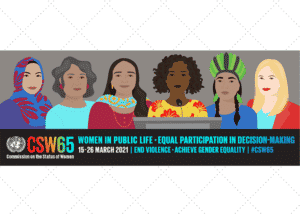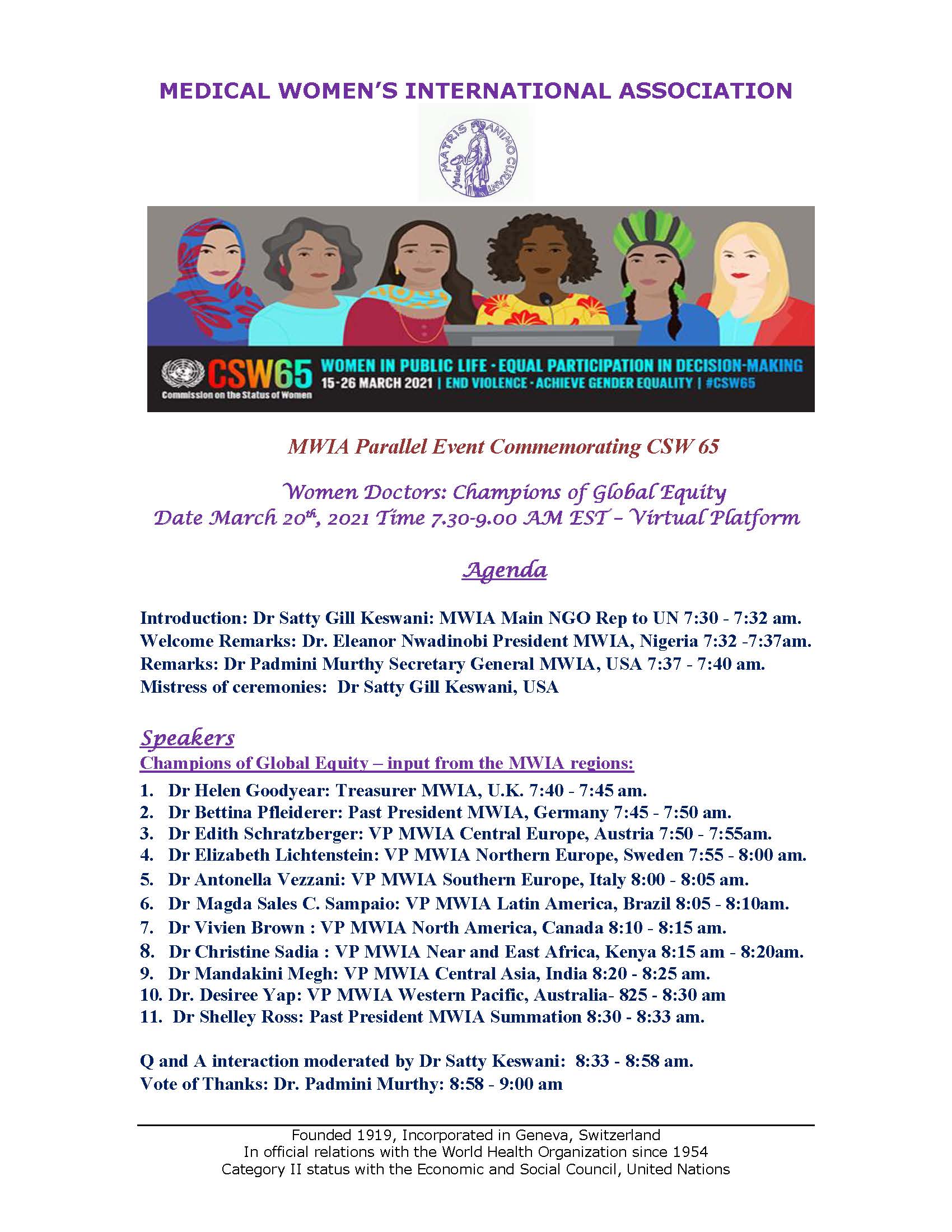Meetings
Meetings of Interest
Events list - CSW68 2024
CSW68 – 68th Commission on the Status of Women
This was held March 11-22, 2024 at the UN New York Headquarters
Themes
Priority theme: Accelerating the achievement of gender equality and the empowerment of all women and girls by addressing poverty and strengthening institutions and financing with a gender perspective
Review theme: Social protection systems, access to public services and sustainable infrastructure for gender equality and the empowerment of women and girls (agreed conclusions of the sixty-third session)
MWIA Statement submitted for CSW68
Introduction
The Medical Women’s International Association calls for an end to violence against women and girls, and greater investment in identification and evidence-based treatment of survivors of interpersonal violence.
It is estimated that nearly one third of women 15 years of age and older experience violence during their lifetime, but fewer than half seek services that will keep them safe and help them recover. Evidence-based policies and clinical guidelines for addressing violence against women are needed in all countries, but only about 50% of countries have clinical guidelines.
Adverse psychological and physical health effects of violence are well documented. These vary among individuals, based on their age, sex, medical conditions, history of prior violence, type of violence, coping ability, domestic and social circumstances, and socioeconomic status. This statement summarizes in brief adverse health effects in women and girls who survive violence, options for psychological treatment, and global progress in developing policies and guidelines for treatment of survivors. Information was derived from the medical literature, and from the following World Health Organization reports: “Responding to intimate partner violence and sexual violence against women, World Health Organization clinical and policy guidelines” 2021 ISBN 978 92 4 154859 5; “Addressing violence against women in health and multisectoral policies, a global status report”, World Health Organization 8 December 2021 ISBN 978-92-4-004045-8; “Global Plan of Action to strengthen the role of the health system within a national multisectoral response to address interpersonal violence, in particular against women and girls, and against children”, World Health Organization 2016 ISBN 978 92 4 151 151153 7.
Biological responses to violence
Interpersonal violence may alter brain structure, the metabolism of neurotransmitters, and the stress response, as well as increase markers of inflammation, and impair glucose metabolism. These adverse effects on the brain and the response to stress may be moderated by genetics, circumstances of the exposure, social conditions, and number of episodes of violence. Neurophysiological adaptation may improve survival but can lead to behaviors and emotions considered inappropriate in a normal environment. Memory, self-control and mental flexibility (adjustment to changed priorities, demands or perspectives) may become impaired in children and adults. This can adversely affect career success, social behaviors and routine activities.
Adverse health effects
Numerous studies show that physical abuse during childhood, including sexual abuse, is associated with increased risk of depression, suicide attempts, personality disorders, substance use, smoking, sexually transmitted infections, unintended pregnancy and behaviors thought to increase the risk of noncommunicable diseases (diabetes, cardiovascular disease). Somatization, development of physical symptoms, may occur. Children witnessing violence in the family may also have adverse psychological, social, physical, and cognitive problems. Some children behave aggressively, break rules, and/or use alcohol, or other drugs.
In adult women who survive physical and/or sexual assault, a common outcome is head injuries which can lead to depression, changes in cognition and mood. Other psychological outcomes are substance abuse, post-traumatic stress disorder and suicidal ideation and attempts. Physical signs and symptoms include lacerations of the face, neck, breast and abdomen; musculoskeletal problems such as fractures, low back pain, chronic pain; gastrointestinal adverse effects including abdominal pain; sexually transmitted infections; vaginitis and cervicitis; urinary tract infections and unintended pregnancy.
The frequency of adverse health outcomes is not well understood. A survey (published in 2009 in Archives Internal Medicine, volume 169) of women in the U.S. using the same health insurance and health care plan found that those who had experienced intimate partner violence in the past year compared to women who had never experienced intimate partner violence, had an almost 6- fold increased risk of substance abuse, 5-fold increase in family and social problems, 2 to 3-fold increase in depression, anxiety or neuroses, and 3- fold increase in sexually transmitted diseases. These data are consistent with prior studies of women seeking treatment in trauma centers.
Treatment options for psychological symptoms and signs
Cognitive behavioral therapy in women and girls, conducted individually or in groups, may reduce anxiety, post-traumatic stress disorder, depression, and substance abuse, and help patients reach safety in their relationships. Interpersonal psychotherapy and cognitive processing therapy, as well as programs focusing on empowerment, building self-efficacy, increasing social networks, and/or relationship safety may also improve post-traumatic stress disorder.
Improvement in psychological symptoms and signs depends upon multiple factors including the type of injury, its location and frequency, social support networks, economic circumstances, cultural norms, and the availability of government support for education and treatment programs.
Adjunctive to psychological therapy, medications that reduce depression, anxiety or improve sleep may be helpful. The use of language that builds strength, instead of pointing out deficiencies, is important; for example, “survivors” rather than “victims”.
Status of policies and guidelines for addressing violence against women
The December 2021 report of the World Health Organization, “Addressing violence against women in health and multisectoral policies: a global status report,” pointed out gaps in policies, clinical guidelines and clinical care practices. Of 194 countries, 81% had multisectoral policies addressing violence against women. Yet only about half of countries (48%) had clinical guidelines or protocols for identification, assessment, and treatment. Fewer than half of countries reported allocation of funding in the budget.
Most countries (78%) committed to training health care providers on violence against women, however, only one quarter (24%) of 174 countries included in their policies the clinical inquiry approach, recommended by the World Health Organization which advises questioning only women who have conditions that could be caused by intimate partner violence. Most countries (90%) designated first line support services, such as shelter and police interventions. Care after rape varied, with about half of countries including information in their policies about emergency contraception, and prophylaxis for human immunodeficiency virus and sexually transmitted infections. Despite the importance of mental health care, only 35% of 174 countries included mental health assessment and referrals to specialists in their policies. Social empowerment interventions were included by fewer than 25% of countries and economic empowerment interventions by one third of countries.
Recommendations
The Medical Women’s International Association supports the elimination of violence against women and girls. As violence is still a pervasive problem, we believe that efforts must also focus on helping survivors of violence. We emphasize training of health professionals in identification and treatment of survivors of violence, location of support services, and legal reporting obligations should they exist. We also emphasize the need for policies, guidelines and protocols providing evidence- based guidance on health care. We suggest the following:
–Identification of survivors of violence by screening women and girls who have depression, anxiety, post-traumatic stress disorder, a history of self-harm or suicidal attempts, and in children, negative behaviors. The benefit of universal assessment has not been demonstrated.
–Assessment of violence and suicide risk in a private, confidential, and safe setting, using women-centered and trauma- informed care, to avoid mental distress.
–Development of a safety plan in collaboration with the patient
–Greater education of health care providers, students of health professions, and communities about the prevalence of violence against women and girls, its mental and physical health consequences, appropriate treatment, location of programs for empowerment and/or recovery, safe housing, and laws regarding physical and sexual violence.
–Training of health professionals and students in women-centered and trauma informed care.
–Community based intervention programs that improve access to healthcare, and social and justice services.
–Development of evidence-based clinical guidelines and specific protocols for assessment and treatment of survivors of violence.
–Government policies that commit to financial support for education of health care providers, increasing the capacity of the healthcare system, community education, intervention programs, and programs to empower women economically.
–Continued collection of data to estimate the prevalence of violence and the success of various therapies and programs.
–Finalization and ratification of the global treaty to end violence against women and girls.
This statement has focused on identification and treatment of survivors. We look towards the future: a world where violence against women and girls is history rather than reality.

65th Commission on the Status of Women
The 65th session of the Commission on the Status of Women was held from March 15-26, 2021.
Find out more here: https://www.unwomen.org/en/csw/csw65-2021
Read official documents for the event here: https://www.unwomen.org/en/csw/csw65-2021/official-documents
- Provisional agenda
- Proposed organisation of work
- NGO statements, including the MWIA Statement
Themes
- Priority theme: Women’s full and effective participation and decision-making in public life, as well as the elimination of violence, for achieving gender equality and the empowerment of all women and girls;
- Review theme: Women’s empowerment and the link to sustainable development (agreed conclusions of the sixtieth session)
Women Doctors: Champions of Global Equality
On March 20th 2021, the Medical Women’s International Association (MWIA) hosted a virtual parallel event entitled “Women Doctors: Champions of Global Equity” to commemorate the 65th session of the CSW. The event was well received by the attendees. Speakers from the past and present MWIA executive committee as well as the MWIA NGO representative to the United Nations shared the work being done in their regions by women doctors in promoting health and well-being among the communities they serve as champions of equity.

